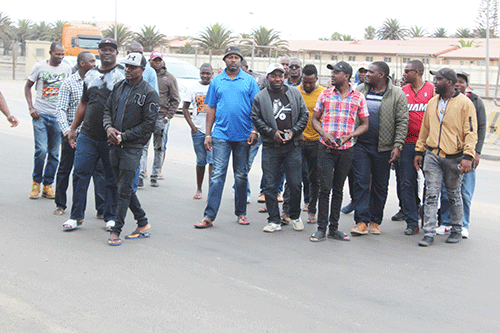WALVIS BAY – The call to compel Icelandic fishing company Samherji to compensate fishermen left destitute after it disappeared overnight following the Fishrot scandal expose, was renewed last week during the launch of a human rights impact study.
The study, conducted over a period of six months by the Institute of Public Policy Research and funded by the British High Commission, sheds light on the plight of the affected fishermen.
In the report, 13 Namibian fishing industry workers provide a human voice to the devastating impact of corruption by detailing their struggles to secure new employment, maintain basic living standards, and participate meaningfully in societal activities. During the report’s launch, fishermen shared harrowing details of their pain and suffering inflicted by Samherji’s actions. “We lost our homes, families, and our children dropped out of schools and university. We are stripped of our dignity”, one fisherman lamented.
The report itself contains detailed personal accounts of how the fishermen navigated the uncertainty coupled with their sudden job losses.
The fishermen were employed on Samherji vessels Saga Seafood, Geysir and Heinaste when the vessels left overnight. The Fishrot saga unfolded after Samherji’s Namibian-based company ceased operations in the country in 2020.
Impact of Corruption
Speaking at the report’s launch, IPPR executive director Graham Hopwood said they interviewed 50 fishermen and some families. The impact of corruption on workers in the fishing industry is a pressing concern, according to Hopwood, who highlights the challenges faced by workers and their families, emphasising the need to build a case for redress and restitution.
He furthermore believes the responsible party, the company, must be held accountable, and international support is crucial. He also suggests setting up a trust or foundation for recompense and compensation.
Hopwood stated that this is a
preliminary report, and they hope to continue and expand this work in the area of human rights. “We’re also planning another study focusing specifically on the economic damage imposed by officials, looking more at the numbers involved in terms of damage to the human economy, as well as the direction of the disappeared money, lost money, and tax evasion. So, we’re still doing a lot of domestic work,” he stated.
The aim is to build a case for redress or some kind of compensation, and the study is not targeting the Namibian government. They are looking beyond borders, to Iceland and other countries and jurisdictions which facilitated Fishrot. Hopwood said Fishrot’s proceeds likely passed through 30 jurisdictions, including South Africa, Norway, Cyprus, and others.
Victims
Reagan Mukande lost his fisherman job in November 2019. His family’s lives have
come to a standstill, with no electricity or water for four years. Mukande, a fisherman with ArcticNam Fishing, a joint venture between Icelandic fishing company
Samherji and Namibian partners, was retrenched on 22 November 2019 after working for over 18 years in the industry.
“Samherji must compensate us. What we hope for is that Samherji come to their senses and pay us. At my age, I just need to be compensated, and then maybe I can do something to employ other people,” he stated in the report.
Another fisherman, Haufiku Ndilinaye, shared a similar story, expressing desire for Samherji to apologise and admit responsibility for the pain and suffering caused to the fishermen.
“Firstly, I want Samherji to apologise to us, the fishermen who worked for the company. They must apologise because they damaged our lives. Then they must pay us,” he stated.
Fisherman Martin Sakeus noted that his mental health doesn’t seem to be improving. “At least they must do something that makes our hearts better. Even if they get us a job or do something to make us happy as previous employees”, he pleaded. The Namibians impacted by the Fishrot scandal are yet to receive adequate redress for the losses they have suffered. As a result, the IPPR now calls for Samherji to issue a formal acknowledgment and apology for its role in Fishrot, directly addressing affected individuals, communities and Namibian society at large.
They also want Samherji to make full redress to the directly-affected and impacted individuals and communities for the disruption and devastation inflicted on their lives because of Fishrot.
-edeklerk@nepc.com.na



